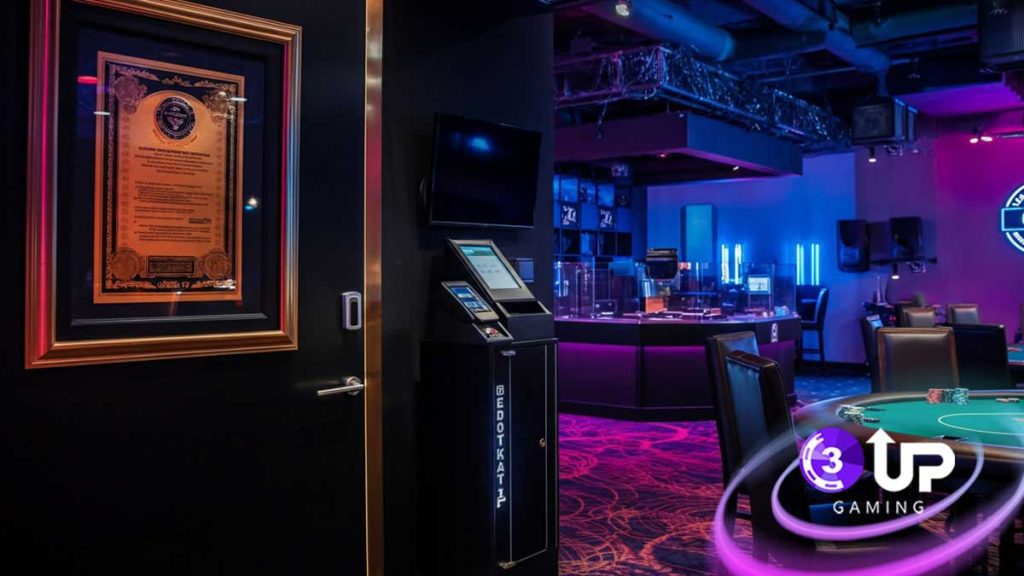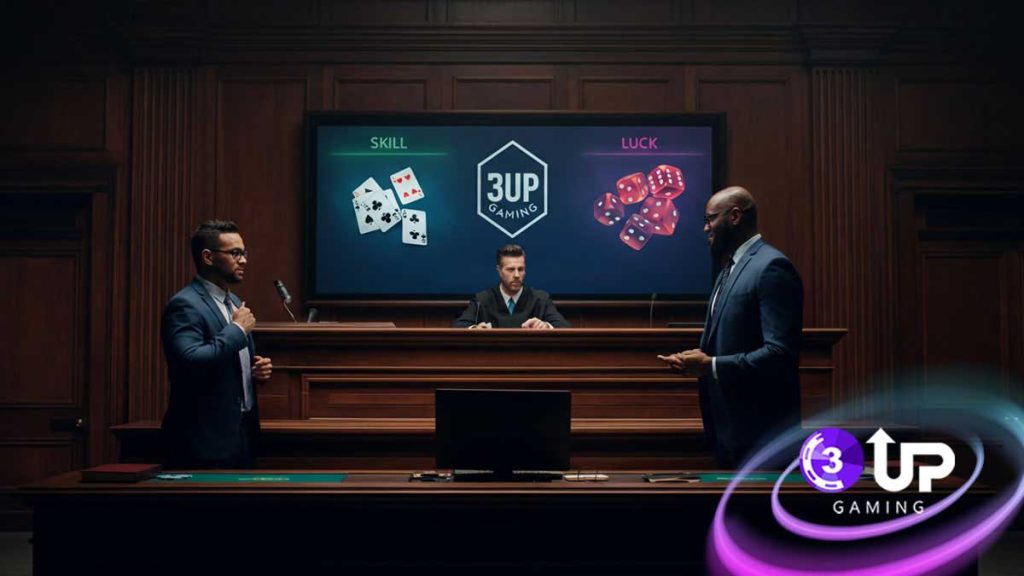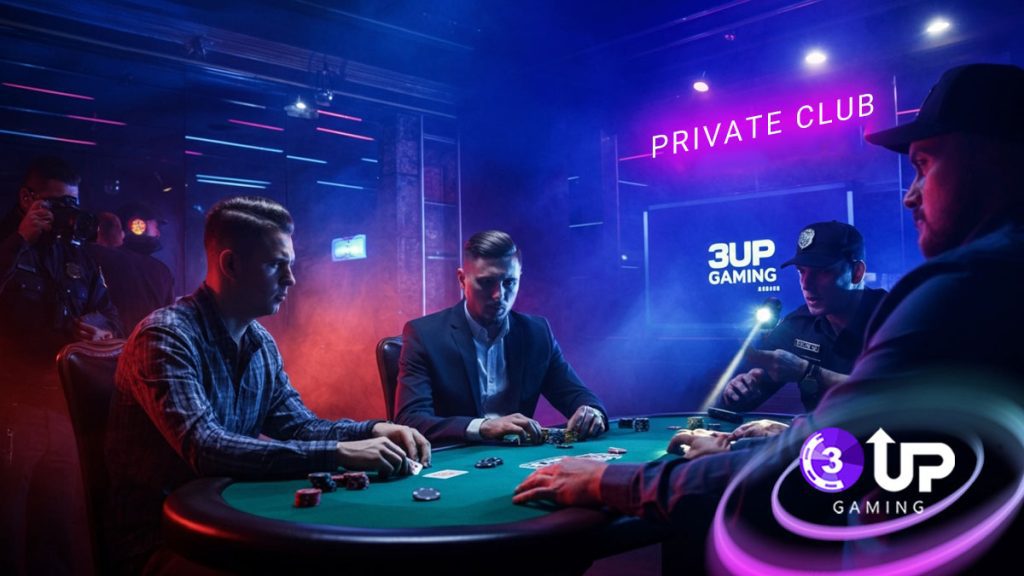Legal Guide to Playing Poker for Real Money in Clubs! Poker is a social game, and yet more and more players are turning away from loud casinos to play in private clubs. They are not your average poker rooms, instead, small, invite-only groups that play real money poker through apps or sites.
Private clubs are not the same. A host or member has extended an invitation to you. At clubs, the chips you use are real money poker chips, and players cash out at the end of the session.
Where poker with actual money in clubs is involved, the law becomes a little murky.
It is legal in some places, illegal in others, and a lot of players aren’t even sure where the line is drawn. That is the entire purpose that this guide was created: to explain, to detail how these games are actually played, and to keep you out of jail.
Websites like 3UP Gaming are trying to bring organization and integrity to this cosmos,but wherever you choose to play, it’s a good idea to know what you’re getting yourself into.
Legal Status of Poker Clubs: Global and U.S. Overview
Poker’s rules don’t just change at the table, they shift depending on where in the world you’re sitting. In some places, private poker clubs run without much fuss. In others, they’re either tightly regulated or completely banned.
That’s mostly because every country, and even individual U.S. states,has its own idea of what gambling means.
U.S. Laws Change State by State
There’s no national rulebook when it comes to real money poker in clubs in the U.S. Each state sets its own laws. So if you’re asking, “Is poker legal in private clubs?” The only right answer is: it depends.
Let’s talk about Texas. Texas clubs do not typically skim off the top of the pot like a casino does. They charge a seat fee or membership fee.
That’s how they say they’re not in the gambling business. Some of those cities are okay with that. Others have shut clubs down.
Now think of Nevada or New Jersey. Poker is legal there, but only at licensed casinos or licensed websites. Utah and Hawaii outright prohibit all gambling, including private games among friends.
The same is applicable to Europe. There is no one rule for the whole of Europe. You must analyze each country individually.
To provide an example:
- France and Italy allow poker but only in licensed establishments.
- Germany made online poker harder to find with new limitations.
- In Sweden, the government operates most gaming, including poker.
Bottom line? poker law by state, no easy answer. If thinking of joining or forming a poker club, do look into local laws first.
Licenses and Permits are Mandatory for Real Money Poker Clubs

It’s not as simple as laying out chips and tables, incidentally. You’ll need to acquire the right poker licenses, too. Otherwise, your real money poker in clubs setup might be shut down,or worse.
What Kind of Poker Licenses Do You Have to Acquire?
Most states or territories have a requirement that legal poker clubs obtain licenses for hosting real-money games. The license would vary according to location. Poker clubs are treated as gaming halls in some locations, while others permit them through social or charitable gaming legislation.
Who Issues the License?
In the US, usually, state gaming commissions or local governments will regulate such clubs. In Nevada, for example, there is the Nevada Gaming Control Board. City councils or tribal gaming boards might do this elsewhere. A local regulator should be approached first before anything.
How to Get a License for a Poker Club
Thinking of opening a poker club? Before the customers are invited to the tables, you will need to go through the licensing procedure. This is essentially how it goes:
- Start by filling out an application with your business details,name, address, and how you will do business.
- Prepare yourself for a background check. Authorities want to ensure that you’re not a troublemaker.
- You’ll also need to provide financial reports to make your business look good and stable.
- Floor plans and security plans can be asked for too, especially if the club will be open in a storefront.
- And of course, there are application fees and license fees that you’ll need to pay.
Keep in mind, the approval process isn’t overnight. In some areas, it’ll be weeks,maybe even months, before you even hear back.
What If You Don’t Get a License?
Running a poker club without a license is a gamble. Here’s what you could lose:
- You could be hit with enormous fines.
- Your club could be closed for good.
- You even stand a chance of being sued.
- And once players know that you’re not a legitimate operation, they’re hard to trust.
Bottom line: it’s not worth it.
Registered Poker Clubs and Home Games
It is important to find out the difference between a home game that is a social one and a registered poker club so that it is known what can and cannot occur.
What Sets Them Apart?
For the most part, a house game is friends gathering and having fun in one individual’s dwelling. A registered poker club, however, is a business governed by set rules and often operates as a venue for real money poker in clubs.
When Is a Home Game Legal?
In most places, home poker game legality depends on whether or not the game breaks a few basic requirements:
- The host does not gain financially from hosting the game.
- No rake or fee can be taken by the house.
- All money is owned by the players.
If an individual takes some amount out of the pot or an entry fee, then the game might be considered illegal gambling.
What About Private Poker Clubs?
Private poker club rules can vary. The moment a club accepts money,a seat fee, membership, or rake,it most likely creates the need for a gaming license. That is when a club falls into the category of being a licensed casino.
Local regulations dictate where the line is drawn. Some places are strict, others less so. But after money exceeds the player winnings threshold, it’s prudent to seek advice from local gaming authorities.
Skill vs. Luck: How It Impacts Legality

Is poker a skill game or a chance game? The answer isn’t as much about how you do it as it is about the fact that it also means whether poker for money is legal or illegal in different places.
Why the Debate Matters
In many parts of the world, games of skill are treated differently from games of chance under the law. If poker is seen as skill-based, it may not be considered gambling at all. But if it’s labeled as a game of chance, stricter rules usually apply.
That is a big difference when it comes to licenses and the police. If poker is lawfully deemed gambling, owners of clubs will often demand gaming licenses, have strict regulations, and might be penalized if they don’t. But if courts decide that poker is more of an art, the policies can be a lot more liberal.
Real-World Examples
In the U.S., this topic has even ended up in court. In 2012, a federal judge in New York ruled in United States v. DiCristina that poker was a game of skill, not chance.
While this didn’t rewrite all gambling laws, it became a reference point in later debates about skill-based poker legality.
A few, like New Jersey and Nevada, are more relaxed, at least partly because they recognize the skill involved in poker. A few others, like Washington or Illinois, continue to consider most forms of pay-for-play poker to be gambling no matter how talented the participants might be.
What This Means for Players and Clubs
Whether poker for money is legal or illegal depends on how local laws define the game. Before launching a poker club or playing in one, it’s smart to check whether your area sees poker as a game of skill or as gambling.
If you want to learn more about how legal poker clubs are set up, check out this guide on poker platform selection.
Club Models and Legal Restrictive Measures
Not all poker clubs employ the same method. While some stick to the classical rake model, others try another model. Instead of charging users a part of the pot, they only ask to pay to play. This setup, known as the membership model, may seem straightforward, but it is still against the law.
How Membership-Based Poker Clubs Work
Whereas casinos take a small percentage off the top of each hand, most poker clubs:
- Charge a table fee to play at the tables, either as an hourly, daily, or monthly fee
- Sell memberships with extra benefits depending on the level
- Leave alone the handling of the money played with
Their intention is to stay within the law by not profiting from the actual games directly. That’s why most believe this model keeps them outside the gambling house rules.
Case Study: Texas Card House
Texas Card House is a great representation of the concept. With multiple properties in the state, it makes players pay for their seat rather than taking a share of the pot. This concept kept the company operating for a while.
But it hasn’t all been plain sailing. Local authorities would periodically inquire whether the model was legal or merely a way of dodging gambling law. A reminder that new business models can be contested.
Why Legal Checks Are Still Necessary
Not scooping the pot doesn’t automatically make a club legal. Laws differ from city to city. What is permissible in one place may be prohibited in another.
Some municipalities demand that clubs obtain licenses or permits,even if they’re not being run as complete casinos. That’s why anyone planning to open a real money poker club needs to be aware of:
- Local poker club membership laws
- And exactly what licenses poker clubs must receive to open
Principles of Taxation for Clubs and Players

Poker clubs and tax are a deadly mix. Whether you’re a club owner or just a player in a club, you’ll be curious about real money poker in clubs , what is taxable income and who has to report it.
Are Poker Winnings in Clubs Taxable?
Yes, are poker winnings in clubs taxable? In the vast majority of jurisdictions, poker winnings are taxable income,even when you are playing in a private or members-only poker club. This applies to both:
- Cash prizes
- Chip prizes that can be exchanged for cash
If you do happen to win a large amount of money, you may be required to report your winnings to the authorities.
Do I Have to Report Poker Club Winnings?
Yes, in total. In the US, for instance, gamblers are required to report all gambling winnings, however minor. So, do I have to report poker club winnings? The answer is yes.
- Even poker clubs report tax forms like a W-2G for big winnings.
- If they do not, you as a player will be the one who keeps track of and reports the winnings.
Club Poker Taxes: Who Pays What
For club owners, club poker taxes can be more complex. If the club is a business, it may be required to report:
- Business income
- All income gained from membership fees, seat rentals, or any service
In certain countries or states, clubs are even required to withhold winnings in part for taxation.
Even if a club does not try to exercise direct control over the outcome of the game (e.g., not raking), local taxing authorities may demand reporting of activity and income.
If you want to learn more about how to legally set up and run a poker club, take a look at the article “Step-by-Step Guide to Turnkey Poker Site Setup” on 3UP Gaming.
Legal Risks for Players and Operators

Gambling at or running a poker club seems like innocent fun,until the club is not licensed, at which time it could land everyone in serious legal trouble.
What’s On the Line?
Unlicensed operation of a poker room can lead to:
- Fines for breaking gambling laws
- Misdemeanor charges for operating illegal games
- In some cases, even criminal charges in the event of a large-scale or frequent operation
These impacts don’t just affect club proprietors. Sometimes, players can also be held responsible.
Can Players Get in Trouble Too?
Yes. In certain regions, just playing in an unlicensed poker club is enough to face legal penalties,especially if you knew the setup wasn’t legal.
Why You Should Always Check
Rules around poker clubs vary a lot depending on where you live. If you’re planning to open a club or even just play for money, make sure you understand local laws. It could be the difference between enjoying a game and facing charges.
Want to learn how to protect yourself while enjoying the game?
Check out “Discover the Best Poker Software for Online Gaming!” on 3UP Gaming for practical insights into legal compliance, safe platforms, and smart play.
Poker Club FAQs
1. Is playing poker for money in a private club legal?
That really depends on where you are. Some places allow poker for real money in clubs if they follow certain rules. Other places don’t allow it at all.
2. Do poker clubs need a license to operate?
Usually, yes. Clubs usually need a license or permit. Without this, they could be fined or closed down.
3. How is a legitimate club different from an underground game?
Legal clubs are licensed and follow local legislation. They usually don’t take a rake of the pot. Underground games are played illegally and could get you into trouble.
4. How are poker winnings taxed?
Most of the places require that you report your poker winnings, especially if you win a large sum.
5. Can I be in legal trouble for playing poker in a club?
Yes. If the club is not licensed, then owners and players alike might be in legal trouble.
6. What are the rules that club owners must follow?
They have to get the correct licenses, follow age rules, keep money correct, and pay taxes.
7. Are there age limits for playing poker in clubs?
Yes, usually you have to be 18 or 21, depending on where you are.
8. Is poker gambling or a game of skill?
It depends on the place. Some see it as gambling, others as a skill game. That changes the laws.



